|
|
|
Sort Order |
|
|
|
Items / Page
|
|
|
|
|
|
|
| Srl | Item |
| 1 |
ID:
175536
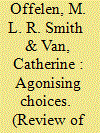

|
|
|
|
|
| Summary/Abstract |
Tragedy is one of the oldest metaphorical lenses of International Relations. The tragic vision of politics, from Thucydides to contemporary realist theorists, lies at the core of classical realism. However, it is striking how rarely the concept of tragedy has been applied to the discourse of humanitarian intervention. This lacuna is a weakness on both the intellectual and political levels, as nowhere are clashes between competing ethical perspectives more glaring. An examination of the concept of tragedy, as conceived from its Greek origins, can illuminate an understanding of the morally contradictory imperatives created by armed intervention. Using the Bosnian War as a case study, Greek classical tragedy provides a framework to grasp the agonising choices and insoluble ethical dilemmas brought about by humanitarian intervention, in contrast to mere narratives of salvation. The argument conveyed in this article seeks to reconcile a tragic vision with the idea of progress and political action. It concludes by suggesting that the fundamental lessons that lie at the heart of tragedy should be associated with another major concept in Greek culture, namely, the Aristotelian idea of phronesis or ‘practical wisdom’.
|
|
|
|
|
|
|
|
|
|
|
|
|
|
|
|
| 2 |
ID:
109595
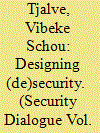

|
|
|
|
|
| Publication |
2011.
|
| Summary/Abstract |
This article pursues three interrelated objectives. Above all, it seeks to theorize desecuritization at the level of polity rather than policy; to distinguish between forms of political order and the likelihood that they will give in to the call for exceptional measures. Second, and to achieve that goal, it suggests a turn away from continental notions of 'the people' and towards American debates over 'the public sphere': a realm deliberately designed and continually cultivated to exercise autonomous, pluralistic and politicized contestation. Third, it examines why the 'speechlessness' of contemporary Western security practices may inhibit that public sphere from functioning properly.
|
|
|
|
|
|
|
|
|
|
|
|
|
|
|
|
| 3 |
ID:
112789
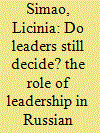

|
|
|
|
|
| Publication |
2012.
|
| Summary/Abstract |
This article looks at Russian foreign policy from the perspective of the individuals responsible for decision making. The focus on the individual level of analysis aims to shed light on the evolving dynamics of Russian foreign policymaking and complement existing analysis on the role of ideas, world views and influential groups in foreign policy analysis, with insights from neo-classical realism and constructivism. Whereas the former sees the state as the transmission belt between international power distributions and political action, the latter underlines the roles of ideas and norms to explain agency. In this context, the article is well placed to deal with the evolving relationship between leaders' views and situational constraints, including other actors involved in setting foreign policy priorities and the external environment. How are decisions taken in the context of Russia's foreign policy under President Putin and Medvedev? What is the role of the presidents from both a legal (constitutional) and a practical perspective? The article maps Russian political leaders' decisions, under Putin and Medvedev, using two case studies: Putin's decision to support the US-led post-9/11 war on terror and Medvedev's decision to go to war with Georgia in 2008.
|
|
|
|
|
|
|
|
|
|
|
|
|
|
|
|
| 4 |
ID:
105708
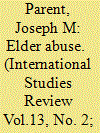

|
|
|
|
|
| Publication |
2011.
|
| Summary/Abstract |
Neorealists narrate their origins by explaining that classical realists committed a multitude of sins and were therefore displaced. The classics unscientifically explained world politics primarily through individual-level characteristics, typically a will to power that drove state behavior and international outcomes. In short, classical realism was inadequately structural and theoretical; thus, neorealists revised them by prioritizing structural factors and putting the paradigm on sound scientific footing. We argue that this narrative is generally incorrect. Classical realists were supremely structural and competently theoretical. Consequently, the realist tradition has much more continuity and richness than presently believed.
|
|
|
|
|
|
|
|
|
|
|
|
|
|
|
|
| 5 |
ID:
128324
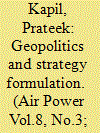

|
|
|
|
|
| Publication |
2013.
|
| Summary/Abstract |
Is there a limit to human will? Is geography a constraint or a legitimate determinant which checks human zeal? Are political geographers overtly deterministic in their analyses and detached to the possibilities of human capabilities? Or are they prudent realists who see the world as it is and not how it should be? These questions from the essence of the use of geopolitics in strategy formulation. It is often rued that American power oscillates among the Vietnam psyche of interventionism, regime change, human rights and promulgation of the liberal international system even at stretched cost. The wars of Iraq and Afghanistan are symptomatic of the former while the Yugoslavian war intervention was symptomatic of the latter. Renowned strategist Robert D Kaplan argues that while there are many human process at work, such extremes can be avoided if nations priorities one major factor in their calculation: geography.
|
|
|
|
|
|
|
|
|
|
|
|
|
|
|
|
| 6 |
ID:
085419
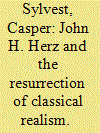

|
|
|
|
|
| Publication |
2008.
|
| Summary/Abstract |
This article argues that the political theory of John H. Herz - best known in International Relations (IR) for the invention of the concept of the security dilemma - reveals a sophisticated body of thought deeply relevant to the ongoing attempt to resurrect classical realism. Like other forms of classical realism, the Herzian variant was strategic and rhetorical in character. Beneath its realist posture we find a liberal ideology focused on achieving order, progress and justice in international politics. Although this positive project began from a pessimistic rendering of the political, Herz's political theory was never fatalistic.
|
|
|
|
|
|
|
|
|
|
|
|
|
|
|
|
| 7 |
ID:
189231
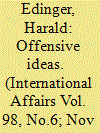

|
|
|
|
|
| Summary/Abstract |
Controversy has surrounded realist explanations of the causes of Russia's war against Ukraine, particularly John Mearsheimer's charge of western responsibility. This article seeks to clarify and contextualize his argument, situating it within the broader paradigm. Realism, and even its narrower offensive sub-school, offers a wide range of contrasting interpretations, depending on which major actors are studied and what characteristics they are endowed with. Like its classical predecessor, structural realism is premised on implicit views of human nature. In an effort to explicate some of these assumptions about the behavioural micro-foundations of states and their leaders, the article investigates main components of structural theory—including power differentials, ‘rational’ interests and states as unitary actors—and connects these concepts to base emotions like fear and anger. It argues that realists do well to differentiate between the aspirations of states and individual leaders' quest for power and status. In the same vein, reference to Russian security concerns may be emblematic of elites' perceived challenges of cultural subordination, and Putin's personal fears for the stability of his regime. Engagement with realist thought is essential, in part because of its continuing influence on policy-making (particularly in Russia) and in order to forestall improper co-option of caricaturized versions of realist arguments.
|
|
|
|
|
|
|
|
|
|
|
|
|
|
|
|
| 8 |
ID:
184233
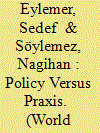

|
|
|
|
|
| Summary/Abstract |
This study analyzes the effects of supranational governance on the refugee crisis in the European Union (EU). The main argument is that the supranational institutions of the EU have often failed to adequately manage the refugee crisis according to its foundational principles of fair burden sharing and solidarity. This failure has gradually discredited the Union’s basic normative principles such as solidarity, hospitality, and respect for human rights. We show that the gaps between certain policies adopted at the Union level and the practices at the national level have widened, and this has led to a familiar defeat of the normative domain by realpolitik, following some central tenets of classical realism. We aim to show that in several areas of EU policy, as well as how individual states have responded to them, national interests and burden shirking, rather than sharing, have unfortunately prevailed.
|
|
|
|
|
|
|
|
|
|
|
|
|
|
|
|
| 9 |
ID:
105950
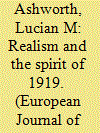

|
|
|
|
|
| Publication |
2011.
|
| Summary/Abstract |
Recent analyses of interwar International Relations (IR) have argued that there was no realist-idealist debate, and that there is no evidence of a distinct idealist paradigm. Less work has been done on realism in the interwar period. This article analyses the thought of one particular early 20th-century realist: Halford J. Mackinder. A product of the development of political geography, and a major influence on American strategic studies, Mackinder is best known for his Heartland thesis, which has been interpreted as environmental determinism. Yet, Mackinder's realism is a complex mix of geopolitical analysis and the influence of ideas on human action. His concepts of organizer and idealist foreign policy ideal types pre-date Carr's realist-utopian distinction by two decades, while his interpretation of the realities of international politics is at odds with Morgenthau's realism. A closer analysis of Mackinder's realism (1) underscores the links between geopolitics and realist strategic studies; (2) demonstrates the diversity of realist approaches in interwar IR; and (3) shows that it was possible to be a realist and also support the League of Nations. There are limits to Mackinder's usefulness to 21st-century IR, but an understanding of his brand of realism is necessary for a fuller understanding of the development of realism as a 20th-century school of thought.
|
|
|
|
|
|
|
|
|
|
|
|
|
|
|
|
| 10 |
ID:
153258
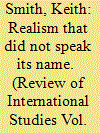

|
|
|
|
|
| Summary/Abstract |
E. H. Carr was one of Europe’s pre-eminent thinkers in the field of international affairs. Yet his contribution to International Relations theory is continually questioned. Realists depict Carr as a quintessential realist; revisionists draw from his wider corpus to qualify his contribution. Although not inaccurate, the revisionist literature is incomplete as it neglects a number of Carr’s diplomatic histories. Refocusing on these, especially the manner in which traces of Ranke’s ‘the primacy of foreign affairs’ tradition is evident, this article points to a more conservative and less critical Carr. Utilising an interpretivist framework, this shift in traditions of thought is explained by the dilemmas Carr faced. Although works of history rather than theory, the article contends that Carr’s diplomatic histories remain relevant, particularly with regard to the embedded criticism of realpolitik they contain. This realisation is made evident through a reading of Carr in parallel with the concept of tragedy.
|
|
|
|
|
|
|
|
|
|
|
|
|
|
|
|
| 11 |
ID:
103661
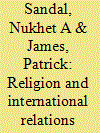

|
|
|
|
|
| Publication |
2011.
|
| Summary/Abstract |
Until the end of the Cold War, it is not an exaggeration to say that only a few theorists of International Relations (IR) or policy-makers engaged in either substantial investigation or articulation of the links between cultural variables like religion and ethnicity on one hand and international affairs on the other. In our article, we argue that this pattern does not do justice to the nature of mainstream IR theories. Although studies are accumulating, how (or whether) religion as a variable can be integrated into mainstream IR thinking still remains in question. We look at three main traditions in IR theory - classical realism, structural realism and neoliberalism - to see how religion can contribute to our understanding of international affairs within those frameworks. We claim that, without stretching the limits of theories or disturbing their intellectual coherence, possibilities for two-way interactions between the frameworks and identity-related variables like religion can be identified.
|
|
|
|
|
|
|
|
|
|
|
|
|
|
|
|
| 12 |
ID:
145981
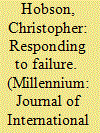

|
|
|
|
|
| Summary/Abstract |
During its first decade in existence, the Responsibility to Protect (R2P) doctrine has struggled to transcend the complexities that plague humanitarian action. This article examines the political challenges that shape the practice of R2P, as well as the discourse that informs it. It reflects on the constant presence of failure that haunts humanitarian intervention, and argues for a more humble stance on what is possible in such situations. Humility entails meditating on human limits, both physical and mental, which serves as an important guide in determining action. It promotes a more chastened position; one that acknowledges that right intentions might not lead to just outcomes, that there are real limits on the ability of external actors to understand or control events during and following an intervention, and that our ability to comprehend such complex situations should warn against premature judgements and confident conclusions. And when failure occurs, it means not denying or avoiding it, but facing it squarely and reckoning with the consequences. The value of adopting a more humble approach will be considered through examining the 2011 Libyan intervention, a significant case for the R2P doctrine. There, success appears to have been exchanged for failure, leaving challenging and unresolved questions about what this experience means for Libya and R2P.
|
|
|
|
|
|
|
|
|
|
|
|
|
|
|
|
| 13 |
ID:
133559
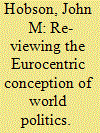

|
|
|
|
|
| Publication |
2014.
|
| Summary/Abstract |
This article responds to the five forum pieces that critically engage my 2012 book The Eurocentric Conception of World Politics, the central argument of which is that ever since 1760 international theory has not provided ideologically neutral, universalist explanations of world politics but has been charged, or even mandated, with the provincial objective of defending, promoting or celebrating Western civilization as the highest referent of the world. The first section defends the book's claim that pre-1945 realism was founded largely on various scientific racist bases (specifically between 1889 and 1945) - what I call 'racist realism' - while the second section defends my claim that classical realism and neorealism are not culturally neutral, universal approaches but are grounded in an underlying Western provincialism. The third section defends my reading of three pioneering figures of IR, John Burgess, Paul Reinsch and J.A. Hobson, while the fourth section reframes my non-Eurocentric reading of international theory in the last 250 years through a gendered lens so as to flesh out how gender/patriarchy and racism/Eurocentric institutionalism are mutually embedded, polymorphous discourses. Finally, the conclusion tackles the dual criticism that the book is limited by its Anglo-centric focus, on the one hand, and its situation within a critical tradition that is inherently European, if not Eurocentric, on the other
|
|
|
|
|
|
|
|
|
|
|
|
|
|
|
|
| 14 |
ID:
090147
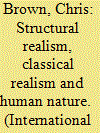

|
|
|
|
|
| Publication |
2009.
|
| Summary/Abstract |
Kenneth Waltz's Theory of International Politics is a modern classic, and deserves to be read the way classic texts ought to be read, i.e. in context and in its own terms. Recovering the context in this case is difficult because of the changes in the discourse since 1979, but one difference between the contemporary and the current reception of the text does seem clear - Waltzian structural realism (or neorealism) is now, but was not then, seen as breaking with the traditions of classical realism. How is this discontinuity to be understood? Part of the answer lies in the rhetoric employed by participants in this debate, but, more substantively, there is a genuine disagreement between neorealism and classical realism over the role played by human nature in international relations. Waltzian neorealism appears, contrary to the tradition, to reject any major role for human nature, describing theories that emphasise this notion as `reductionist'; however, on closer examination, the picture is less clear-cut. Waltz's account of human nature can be related quite closely to the major strands in the realist genealogy, but at a tangent to them. Interestingly, and perhaps unexpectedly, it is also compatible with at least some of the findings of contemporary evolutionary psychology.
|
|
|
|
|
|
|
|
|
|
|
|
|
|
|
|
| 15 |
ID:
107613
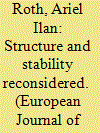

|
|
|
|
|
| Publication |
2011.
|
| Summary/Abstract |
The argument that multipolar international systems are less stable because certain states have an incentive to externalize the costs of defense to other states has been built on interpretations of the behavior of France, Russia, and especially Great Britain between the two World Wars. This article addresses flaws in both the use of the French and Russian cases, but is most tightly focused on the British case, which was the strongest, prima facie, of the three. This article demonstrates how the British scheme for defense against Germany was not a policy of attempted externalization on either the political or military level. Consequently, the long debate over the relationship between systemic structure and systemic stability, which has been heavily influenced by the belief in the existence of an incentive to externalize defense costs under multipolarity, must be re-examined, with new tests run and new conclusions explored.
|
|
|
|
|
|
|
|
|
|
|
|
|
|
|
|
| 16 |
ID:
145675
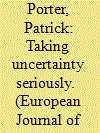

|
|
|
|
|
| Summary/Abstract |
If we can’t reliably predict the future, how can we be wise when preparing for it? Examining the UK’s ‘Strategic Defence and Security Review’ of 2010, I demonstrate that though planners often rightly invoke uncertainty, they also imply a highly certain ideology about Western power and foresight. Modern ‘national security states’ describe the world as dangerously uncertain, yet fall prey to a misplaced confidence in their ability to anticipate and prevent threats. I argue that classical realism, especially that of Clausewitz and Morgenthau, is a valuable resource for handling uncertainty more reflexively. Classical realism counsels that governments should go beyond attempts to improve foresight. They should try to check against the fallibility of their assumptions, marshal their power more conservatively, insure against the likelihood of predictive failure by developing the intellectual capability to react to the unknown, and avoid misplaced confidence in their ability to bring order into chaos.
|
|
|
|
|
|
|
|
|
|
|
|
|
|
|
|
| 17 |
ID:
110827
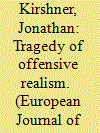

|
|
|
|
|
| Publication |
2012.
|
| Summary/Abstract |
What is the realist position on how to deal with the rise of China? One prominent realist approach, associated with John Mearsheimer, calls for the US to do whatever it can to slow China's rise. However, while this is a realist perspective, it is not the realist perspective. In particular, realist approaches that derive from a classical foundation suggest policies fundamentally different from those favored by Mearsheimer. This article argues that realism should return to some of its classical traditions. It reviews why, from a classical realist perspective, the rise of China must be viewed with alarm, but argues that Mearsheimer's approach - offensive realism - is wrong, and dangerous. Many of these errors are rooted in structuralism; a classical realist approach, which allows for the influence of history and politics, provides greater analytical purchase and wiser policy prescriptions than offensive realism.
|
|
|
|
|
|
|
|
|
|
|
|
|
|
|
|
| 18 |
ID:
077211
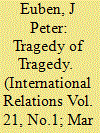

|
|
|
|
|
| Publication |
2007.
|
| Summary/Abstract |
There are good reasons to consider tragedy, especially Greek tragedy, a resource for current debates in international relations. This is not only because of the ethical and political dilemmas tragedy explores with such dramatic force, but because tragedy is a significant context for reading Thucydides with the political and literary acumen he demands. To ignore this context is to domesticate the ways tragedy challenges both our conventional readings of Thucydides as well as our substantive views of politics and the ways we study it. While this article fully supports the enterprise of invigorating classical realism with the study of tragedy and of posing the question, 'What can a tragic sensibility contribute to our understanding of international politics?', it makes that enterprise and that question more rather than less problematic. But it does so in the name of Greek tragedy and for an ultimately more challenging appropriation of it.
|
|
|
|
|
|
|
|
|
|
|
|
|
|
|
|
| 19 |
ID:
085571
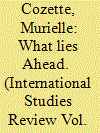

|
|
|
|
|
| Publication |
2008.
|
| Summary/Abstract |
Realism contends that politics is a struggle for power and/or survival, and consequently depicts international politics as a realm of recurrent conflicts among states with very little prospect for change. It is therefore not traditionally regarded as an approach which entertains an idea of progress. E.H Carr famously rejected "pure realism" as an untenable position precisely because it fails to provide "a ground for action," and advocated finding a delicate balance between realism and utopia, as meaningful political action must include both. While realism certainly entails a degree of pessimism, it is far fetched to claim that realist scholars are radically sceptical about the future of international relations. The article investigates Hans Morgenthau and Raymond Aron, two leading classical realist scholars, and argues that neither advocated a strict version of power politics.
|
|
|
|
|
|
|
|
|
|
|
|
|
|
|
|
| 20 |
ID:
086293
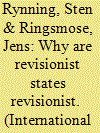

|
|
|
|
|
| Publication |
2008.
|
| Summary/Abstract |
In this article, we argue that Realism recently has eschewed big and important questions of war and peace and that revived Classical Realism can help bring Realism back on track. Modern Realists tend to assume that states are either all status quo players or all revisionists, and the result is a slippery grasp of the sources and dynamics of international change. To revive Classical Realism, we examine three dominant sets of criticism. We notably return to the classical texts of Realism to show that the classics were in fact not reductionist: they did not reduce either systemic or national phenomena (third and second image theory) to human nature (first image). Classical Realists understood the many intricate and delicate connections between these levels, and it is modern era Realists who are reductionists because they reduce explanations to systemic phenomena. We show how Classical Realism can respond in strength to its critics and ask the kind of research questions that again will advance our understanding of international change.
|
|
|
|
|
|
|
|
|
|
|
|
|
|
|
|
|
|
|
|
|